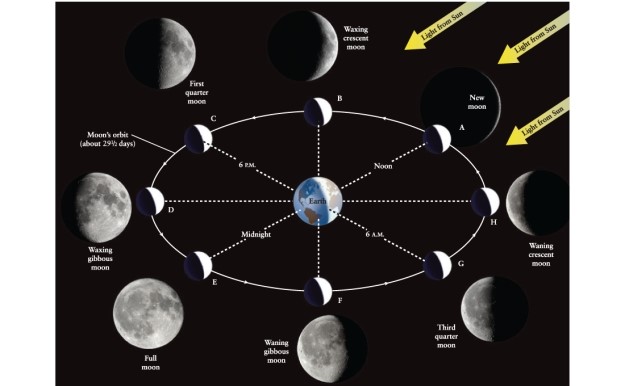Exam 3: Eclipses and the Motion of the Moon
Exam 1: Astronomy and the Universe78 Questions
Exam 2: Knowing the Heavens99 Questions
Exam 3: Eclipses and the Motion of the Moon67 Questions
Exam 4: Gravitation and the Waltz of the Planets105 Questions
Exam 5: The Nature of Light91 Questions
Exam 6: Optics and Telescopes97 Questions
Exam 7: Comparative Planetology I: Our Solar System63 Questions
Exam 8: Comparative Planetology II: the Origin of Our Solar System53 Questions
Exam 9: The Living Earth78 Questions
Exam 10: Our Barren Moon101 Questions
Exam 11: Mercury, Venus, and Mars: Terrestrial, yet Unique99 Questions
Exam 12: Jupiter and Saturn: Lords of the Planets97 Questions
Exam 13: Jupiter and Saturns Satellites of Fire and Ice110 Questions
Exam 14: Uranus, Neptune, Pluto, and the Kuiper Belt: Remote Worlds105 Questions
Exam 15: Asteroids, Comets, and Impacts80 Questions
Exam 16: Our Star, the Sun68 Questions
Exam 17: The Nature of the Stars113 Questions
Exam 18: The Birth of Stars97 Questions
Exam 19: Stellar Evolution: on and After the Main Sequence64 Questions
Exam 20: Stellar Evolution: The Death of Stars78 Questions
Exam 21: Stellar Remnants: Neutron Stars and Black Holes107 Questions
Exam 22: Our Galaxy48 Questions
Exam 23: Galaxies85 Questions
Exam 24: Quasars and Active Galaxies73 Questions
Exam 25: Cosmology: The Origin and Evolution of the Universe68 Questions
Exam 26: Exploring the Early Universe72 Questions
Exam 27: The Search for Extraterrestrial Life26 Questions
Select questions type
Earth and the Moon both move eastward in their orbits. Suppose the Moon moved westward instead, at the same rate as its actual eastward movement. What consequence would this have?
(Multiple Choice)
4.8/5  (40)
(40)
Which of the following investigations did the Ancient Greeks NOT carry out?
(Multiple Choice)
4.9/5  (46)
(46)
When does the third quarter moon rise? (You may want to examine Figure 3-2 of Universe, 11th ed., and think about where you would need to stand on Earth to see the third quarter moon rising.)

(Multiple Choice)
4.7/5  (46)
(46)
How fast does the Moon move across our sky against the background of stars? (Hint: Through what angle does the Moon move around the sky in 1 month?)
(Multiple Choice)
5.0/5  (38)
(38)
In order to obtain the shadow lengths he did, Eratosthenes had to make his measurements on the:
(Multiple Choice)
4.9/5  (37)
(37)
When in total lunar eclipse, the Moon shows a reddish color because:
(Multiple Choice)
4.8/5  (38)
(38)
Is the Moon ever visible during the daytime (on a clear day)?
(Multiple Choice)
4.7/5  (31)
(31)
Approximately how long will it take for the dark-light dividing line on the Moon, the terminator, to move through 90° of lunar longitude?
(Multiple Choice)
4.8/5  (31)
(31)
During a total lunar eclipse (as viewed from Earth) you are standing on the Moon looking back at Earth. What do you see?
(Multiple Choice)
4.8/5  (33)
(33)
If the Moon in its orbit around Earth moves between Earth and the Sun and then 2 weeks later it moves to the other side of Earth as seen from the Sun, why then do we not see both a solar and a lunar eclipse every month?
(Multiple Choice)
5.0/5  (38)
(38)
One of the most significant achievements of the ancient Greeks was the:
(Multiple Choice)
4.9/5  (43)
(43)
How does the duration of a total solar eclipse compare with the duration of a total lunar eclipse?
(Multiple Choice)
4.9/5  (38)
(38)
The Moon moves eastward in its orbit. It always keeps the same face toward Earth. This means that it:
(Multiple Choice)
4.9/5  (40)
(40)
You travel to an exotic place to observe a total solar eclipse in December and someone on this trip tells you that the next eclipse to occur on Earth will be a lunar eclipse in March. Is this likely to be true?
(Multiple Choice)
5.0/5  (40)
(40)
The waning gibbous phase of the Moon occurs when the Moon passes:
(Multiple Choice)
4.8/5  (42)
(42)
Earth rotates eastward on its axis. The Moon moves to the east in its orbit around Earth. The Moon also rises about 1 hour later each night. Suppose the Moon moved westward instead. What consequence would this have?
(Multiple Choice)
4.8/5  (37)
(37)
Showing 21 - 40 of 67
Filters
- Essay(0)
- Multiple Choice(0)
- Short Answer(0)
- True False(0)
- Matching(0)